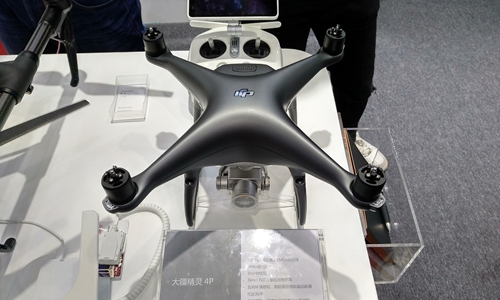HOME >> SOURCE,SPECIAL-COVERAGE
Shenzhen's high-tech industry resumes operations despite NCP assault
By Song Lin Source:Global Times Published: 2020/2/10 18:02:16

Photo: VCG
High-tech industries in Shenzhen, South China's Guangdong Province, have begun gradually resuming operations on the premise of sound epidemic prevention.
Experts noted that the high-tech sector could resume operations more easily than others due to its advanced informatization management systems, and that its research and development (R&D) projects would not see much impact in the short term.
China's leading drone maker DJI has resumed operations with the majority of its employees now working from home. Its staff who have completed a quarantine period of 10-14 days and whose jobs require them to be on-site have returned to their offices, a spokesperson of the firm told the Global Times on Monday.
DJI's production and R&D progress will not be impacted by the novel coronavirus pneumonia outbreak, the spokesperson said.
Tech giant OPPO, one of China's biggest smartphone vendors, has maintained orderly operations through its global coordination and production capacity across the world, the company's spokesperson told the Global Times.
As a base for high-tech firms in Shenzhen, an avenue named Yuehai in the city's Nanshan District which is home to 34,000 companies and over 900 high-tech enterprises is ready to resume work, the Xinhua News Agency reported on Sunday.
With sound epidemic prevention facilities, firms can resume operations after approved by local government departments. The gradual resumption of production shows the city has started to recover from the epidemic, the report said.
In addition to each company's own preparations, government departments across the country have rolled out measures to support firms in resuming normal business operations as soon as possible.
Nanshan District on Saturday announced 12 measures to help firms get back on track, including rent subsidies, financing support and the supply of protective materials, with expected rent subsidies of more than 50 million yuan ($7.16 million), according to media reports.
Compared to manufacturing and other sectors, the resumption of operations for high-tech industries is relatively simple due to their advanced informatization management systems, Liu Dingding, a veteran industry expert, told the Global Times on Monday.
With sound epidemic prevention measures, high-tech industries' R&D progress will not be heavily impacted in the short term, Liu said. He also pointed out that any potential long-term impact depends on the development of the epidemic, as high-tech R&D needs to test realistic scenarios.
In addition to striving to resume production, multiple high-tech firms have launched online services to help staff from other firms work remotely.
Shenzhen-based tech giant Tencent's cloud-computing brand Tencent Cloud launched a free cloud working package to help enterprises adopt efficient remote-working approaches, according to a statement posted by the company on China's Twitter-like social media platform Weibo.
Huawei in Shenzhen and IT knowledge platform Geekbang Corp in Beijing jointly initiated a movement involving about 100 enterprises, offering online services including education, medical services, data analysis and remote-working tools to individuals and enterprises.